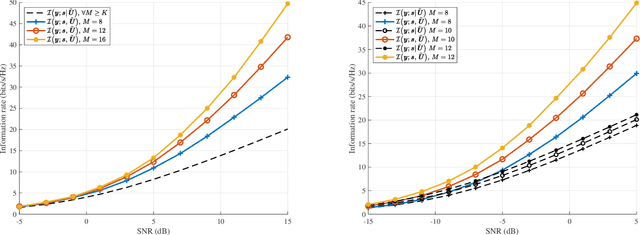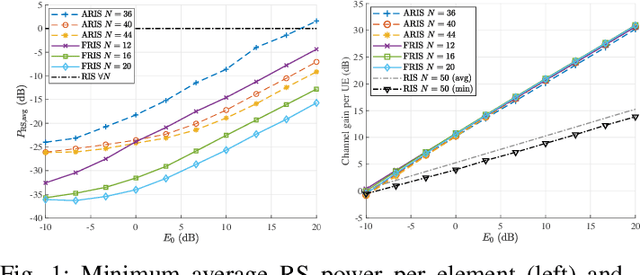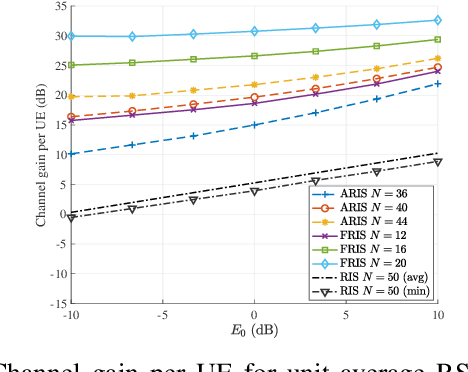Juan Vidal Alegria
Increased Multiplexing Gain with Reconfigurable Surfaces: Simultaneous Channel Orthogonalization and Information Embedding
Oct 30, 2023
Abstract:Reconfigurable surface (RS) has been shown to be an effective solution for improving wireless communication links in general multi-user multiple-input multiple-output (MU-MIMO) setting. Current research efforts have been largely directed towards the study of reconfigurable intelligent surface (RIS), which corresponds to an RS made of passive reconfigurable elements with only phase shifting capabilities. RIS constitutes a cost- and energy- efficient solution for increased beamforming gain since it allows to generate constructive interference towards desired directions, e.g., towards a base station (BS). However, in many situations, multiplexing gain may have greater impact on the achievable transmission rates and number of simultaneously connected devices, while RIS has only been able to achieve minor improvements in this aspect. Recent work has proposed the use of alternative RS technologies, namely amplitude-reconfigurable intelligent surface (ARIS) and fully-reconfigurable intelligent surface (FRIS), to achieve perfect orthogonalization of MU-MIMO channels, thus allowing for maximum multiplexing gain at reduced complexity. In this work we consider the use of ARIS and FRIS for simultaneously orthogonalizing a MU-MIMO channel, while embedding extra information in the orthogonalized channel. We show that the resulting achievable rates allow for full exploitation of the degrees of freedom in a MU-MIMO system with excess of BS antennas.
Channel Orthogonalization with Reconfigurable Surfaces
Apr 28, 2023


Abstract:Orthogonal multi-user multiple-input multiple-output (MU-MIMO) channels allow for optimum performance with simplified precoding/equalization, and they achieve maximum multiplexing gain which is shared fairly among users. Reconfigurable intelligent surface (RIS) constitutes a promising cost-efficient solution to improve the wireless channel, since they consist of passive reflecting elements able to adjust the phases of the incoming waves. However, it is still widely unclear how these surfaces can improve spatial-multiplexing. In fact, the common RIS model cannot achieve perfect orthogonalization of MU-MIMO channels with a reasonable number of elements. Furthermore, efficient channel estimation algorithms for RIS, which are key for taking advantage of its benefits, are still a matter of research. We study two types of reconfigurable surfaces (RSs), namely amplitude-reconfigurable intelligent surface (ARIS) and fully-reconfigurable intelligent surface (FRIS), with extended capabilities over RIS. We show how these RSs allow for perfect channel orthogonalization, and, by minimizing the applied power, we show that they can potentially be implemented without the need of amplification. We also present an efficient channel estimation method for each of them that allows the base station (BS) to select the desired propagation channel.
* Presented at IEEE GLOBECOM Workshops 2022
 Add to Chrome
Add to Chrome Add to Firefox
Add to Firefox Add to Edge
Add to Edge